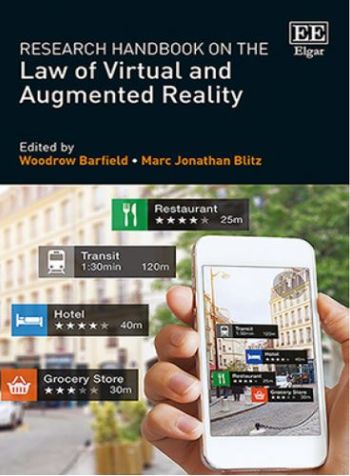
The proliferation of virtual and augmented reality technologies into society raise significant questions for judges, legal institutions, and policy makers. For example, when should activities that occur in virtual worlds, or virtual images that are projected into real space (that is, augmented reality), count as protected First Amendment ‘speech’? When should they instead count as a nuisance or trespass? Under what circumstances would the copying of virtual images infringe intellectual property laws, or the output of intelligent virtual avatars be patentable inventions or works of authorship eligible for copyright? And when should a person (or computer) face legal consequences for allegedly harmful virtual acts?
The Research Handbook on the Law of Virtual and Augmented Reality addresses these questions and others, drawing upon free speech doctrine, criminal law, the law of data protection and privacy, and of jurisdiction, as well as upon potential legal rights for increasingly intelligent virtual avatars in VR worlds. The Handbook offers a comprehensive look at challenges to various legal doctrines raised by the emergence – and increasing use of – virtual and augmented reality worlds, and at how existing law in the U.S., Europe, and other jurisdictions might apply to these emerging technologies, or evolve to address them. It also considers what legal questions about virtual and augmented reality are likely to be important, not just for judges and legal scholars, but also for the established businesses and start-ups that wish to make use of, and help shape, these important new technologies.
This comprehensive Research Handbook will be an invaluable reference to those looking to keep pace with the dynamic field of virtual and augmented reality, including students and researchers studying intellectual property law as well as legal practitioners, computer scientists, engineers, game designers, and business owners.